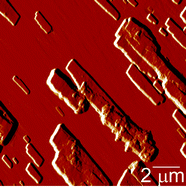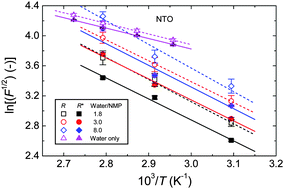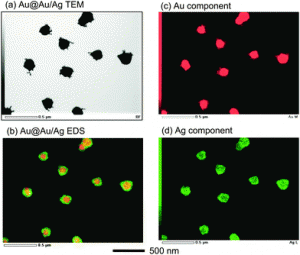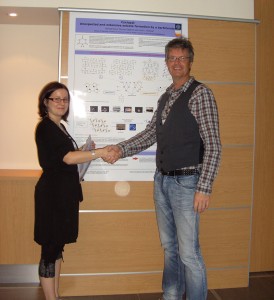Congratulations to Raeeun Lee from the Osaka University in Japan– recent winner of the CrystEngComm Poster Prize at the 60th JSCC Symposium which took place in Osaka from the 27th-30th September!
Author Archive
Hot Article: Stilbazolium organic optical crystals
In their CrystEngComm Hot Article, O-Pil Kwon and colleagues have developed a new cation core structure, N-benzyl stilbazolium nonlinear optical chromophore with a non-polar benzyl group to achieve acentric molecular ordering in the crystalline state.
 Acentric nonlinear optical N-benzyl stilbazolium crystals with high environmental stability and enhanced molecular nonlinearity in solid state
Acentric nonlinear optical N-benzyl stilbazolium crystals with high environmental stability and enhanced molecular nonlinearity in solid state
Pil-Joo Kim, Jae-Hyeok Jeong, Mojca Jazbinsek, Seong-Ji Kwon, Hoseop Yun, Jong-Taek Kim, Yoon Sup Lee, In-Hyung Baek, Fabian Rotermund, Peter Günter and O-Pil Kwon
CrystEngComm, 2010, DOI: 10.1039/C0CE00456A
READ FOR FREE! Until the 2nd of November.
Flowery magnetic microspheres clean water
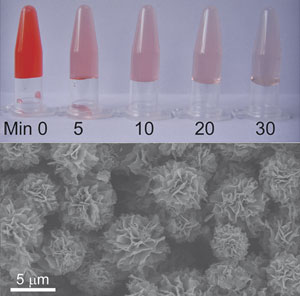 Industrial wastewater containing toxic metal ions and organic pollutants has become a serious threat to the environment and public health. So the synthesis of three-dimensional micro and nanomaterials with the capability of absorbing undesired water contaminants in a straightforward and effective manner is a priority for environmental scientists.
Industrial wastewater containing toxic metal ions and organic pollutants has become a serious threat to the environment and public health. So the synthesis of three-dimensional micro and nanomaterials with the capability of absorbing undesired water contaminants in a straightforward and effective manner is a priority for environmental scientists.
Now Hongjie Zhang and colleagues at Changhun Institute of Applied Chemistry, have designed an easy method to synthesise flower-shaped Fe3O4 microspheres with magnetic properties, which can be used as absorbents to treat wastewater. Unlike previous synthetic routes, Zhang’s hydrothermal method avoids the use of surfactants and copolymers that would need to be removed from solution.
Find out more about this article in Lorena Tomas Laudo’s story here Hierarchically structured Fe3O4 microspheres: morphology control and their application in wastewater treatment
Xiyan Li, Zhenjun Si, Yongqian Lei, Xiaona Li, Jinkui Tang, Shuyan Song and Hongjie Zhang,
CrystEngComm, 2010 DOI: 10.1039/c0ce00217h
Or read the CrystEngComm article for FREE until the 2nd of November:
Renal failure culprit: growth of melamine–cyanuric acid crystals
Daniele Musumeci and Michael D. Ward study the growth of melamine-cyanuric acid crystals using real time in situ atomic force microscopy. Read more about their research in this CrystEngComm Hot Communication which reveals that hydrophobic interactions between 2D hydrogen-bonded planar sheets play a dominant role in the crystal growth of this material, which has been shown to cause renal failure.
Elucidation of the crystal growth mechanism of melamine-cyanuric acid by using real time in situ atomic force microscopy
Daniele Musumeci and Michael D. Ward
CrystEngComm, 2010, DOI: 10.1039/c0ce00364f
READ NOW! Free to access until the 20th of October.
Optimising garnet films for magneto-optical sensors
In this Hot Article Griesbauer and colleagues attempt to deposit magneto-optical materials such as Bi3Fe5O12 onto non-garnet substrates, such readily available cheap SiO2. using an additional buffer layer of annealed Y3Fe5O12.
 Mechano- and magneto-optical sensitivity of YIG buffer systems
Mechano- and magneto-optical sensitivity of YIG buffer systems
J. Griesbauer, T. Körner, T. Wehlus, A. Heinrich, B. Stritzker, J. Simon and W. Mader
CrystEngComm, 2010, DOI: 10.1039/C003533E
READ NOW! Free to access until the 20th of October.
Polycrystal peacocks
Polycrystalline patterns are complex and often difficult to distinguish by eye alone. Erica Gunn, Bart Kahr and colleagues use extinction mapping techniques to study the development of polycrystalline patterns from solution, carefully controlling the crystallization driving force. Read more about their study and check out the beautiful and mesmerising patterns in their CrystEngComm Hot Article!
Extinction mapping of polycrystalline patterns
Erica Gunn, Liana Wong, Charles W. Branham, Brian Marquardt and Bart Kahr
CrystEngComm, 2010, DOI: 10.1039/c0ce00359j
READ NOW! Free to access until the 20th of October.
In the ‘metastable’ zone: crystal nucleation investigated
Crystallization from solutions is used for the separation and purification of industrial chemicals and for controlling the shape and size of final crystalline products. The efficiency of these processes is determined by the nucleation of crystals and their development in the liquid phase, and is intimately connected with the metastable zone width of the liquid phase. In this CrystEngComm articles Keshra Sangwal investigates the metastable zone width of various systems using the polythermal method to further the understanding of these important processes.
Some features of metastable zone width of various systems determined by polythermal method
Keshra Sangwal
CrystEngComm, 2010, DOI: 10.1039/c0ce00065e
READ NOW! Free to access until the 20th of October.
Smart seeding to create gold-silver alloy shell nanoparticles
In this CrystEngComm Hot Article, Xinling Tang and Masaharu Tsuji from Kyushu University, Japan study the effects of shapes of Au cores on the growth of Ag shells using dendritic branched Au nanoparticles as Au seeds in DMF. They succeeded in the preparation of Au core Au/Ag alloy denoted as Au@Au/Ag particles.
Synthesis of Au core Au/Ag alloy shell nanoparticles using branched Au nanoparticles as seeds
Xinling Tang and Masaharu Tsuji
CrystEngComm, 2010, DOI: 10.1039/c0ce00018c
READ NOW! Free to access until the 20th of October.
CrystEngComm Poster Prize winner in Bologna
Congratulations to Denise Rossi from the University of Innsbruck in Austria – winner of the CrystEngComm Poster Prize at the 5th Bologna convention on crystal forms which took place in Bologna, Italy from the 2nd-4th September.
The title of Denise’s winning poster is’Cyclopal: Unexpected and extensive solvate formation by a barbiturate‘.
Read some related CrystEngComm articles:
Can a small amount of crystal solvent be overlooked or have no structural effect? Isomorphous non-stoichiometric hydrates (pseudo-polymorphs): the case of salicylaldehyde thiosemicarbazone
Hassan Hosseini Monfared, Anne-Christine Chamayou, Soliman Khajeh and Christoph Janiak
CrystEngComm, 2010,DOI: 10.1039/C0CE00041H
Solid state characterisation of four solvates of R-cinacalcet hydrochloride
Doris E. Braun, Volker Kahlenberg, Thomas Gelbrich, Johannes Ludescher and Ulrich J. Griesser
CrystEngComm, 2008, 10, 1617-1625 DOI: 10.1039/B809219B
Gas–solid reactions between the different polymorphic modifications of barbituric acid and amines
Dario Braga, Marcella Cadoni, Fabrizia Grepioni, Lucia Maini and Katia Rubini
CrystEngComm, 2006, 8, 756-763 DOI: 10.1039/B603910











